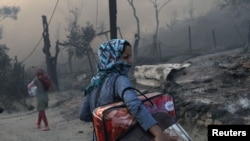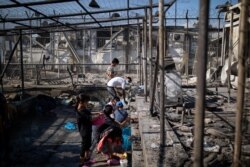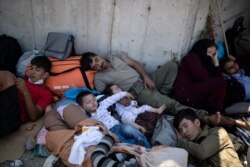Fire destroyed much of Greece's largest refugee camp early Wednesday, displacing thousands of refugees and asylum-seekers amid a camp-wide outbreak of COVID-19.
The Moria Reception and Identification Center on the island of Lesbos was 80% destroyed in the blaze, according to the International Organization for Migration (IOM).
Online video showed snapping flames engulfing the camp's wood and metal structures, lit orange in the darkness, as white-hot embers floated past.
Many of Moria's 12,600 migrants were displaced. More than 4,000 children, including 407 unaccompanied children, had been living in the camp. Moria was built to accommodate 3,000 people, but its migrant population has swelled to over 20,000 in the past.
No fatalities have been reported. The cause of the blaze has not been confirmed, but authorities were investigating whether it was purposefully set, potentially in protest of the recent COVID-19 lockdown.
"There was not just one, but many fires in the camp. Migrants threw stones at firefighters trying to put out the fires. The cause is under investigation," Constantine Theophilopoulos, fire brigade chief for the northern Aegean, told ERT TV.
The fire began in several locations after authorities tried to isolate some migrants who tested positive for COVID-19, reported Reuters. The camp was placed under lockdown last week after an asylum-seeker tested positive.
In the wake of the fire, authorities did not know the whereabouts of 35 migrants who tested positive this week.
Greek Prime Minister Kyriakos Mitsotakis had announced a four-month state of emergency for the island, which makes more resources available to address the crisis.
Some asylum-seekers were trying to reach Mytilini, a nearby town. Mytilini Mayor Stratis Kytelis said some migrants would need to be moved to ships to prevent the spread of COVID-19, but government spokesman Stelios Petsas said camp residents would not be allowed to leave Lesbos due to the pandemic, according to Reuters.
European Union Home Affairs Commissioner Ylva Johansson announced the EU would fund the immediate transfer of the 400 unaccompanied children, as well as provide accommodations.
For refugee advocates, Moria has become a symbol of Europe's increasingly strict approach to migrants. In 2016, the EU began blocking the flow of travel to Western European countries like Germany. Overcrowding, alongside overall living conditions, worsened at refugee camps in European border countries like Greece.
"This fire was expected," Eva Cossé, who researches Greece for nongovernmental organization Human Rights Watch, told The New York Times. "It's not surprising. It's a testament to the European Union's negligence and Greece's negligence."
Greece's deputy migration minister, George Koumoutsakos, said about 3,000 migrants and refugees would be temporarily housed in tents as the government struggles to find them alternative shelter, Reuters reported.







